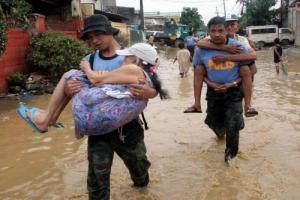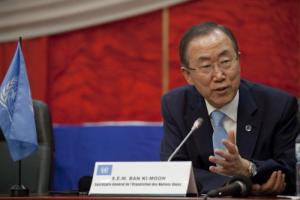Environment
Governments must seize the opportunity to tackle climate change

WWF staff participate in a rally calling for action on climate change on Doha, Qatar on the sidelines of COP18 talks.
- Read more
- 412 reads
Philippines: UN boosts relief efforts to respond to super typhoon Haiyan

An average of 20 typhoons a year strike the Philippines.
- Read more
- 534 reads
In Burkina Faso, Ban urges cooperation to help Sahel countries tackle climate change impacts

Secretary-General Ban Ki-moon talks with government ministers of Burkina Faso in the capital Ouagadougou.
- Read more
- 365 reads
WWF: Scaled up renewables a viable solution to cutting dangerous emissions

Seize Your Power
- Read more
- 405 reads
Shell Accused of Misreporting Oil Spills as Pipeline Thefts
Amnesty International says it has uncovered proof that Shell Petroleum conceals the amount of oil it spills in Nigeria's Niger Delta region. Shell maintains most of the oil it loses is due to theft, not to slipshod operations and management.
- Read more
- 430 reads
Flooding Cuts Off Road Linking S. Sudan, Uganda
Heavy rains have washed out a strategic road connecting South Sudan and Uganda, stranding travellers and truck drivers at the border and severely disrupting trade.
- Read more
- 367 reads
Protection of Antarctica's seas put on ice

Iceberg, Pleneau Bay, Antarctic Peninsula, Antarctica
- Read more
- 358 reads
Cook Islands Joins Pilot Program to Insure Against Natural Disasters
The Pacific Catastrophe Risk Insurance Pilot was renewed for its second season, with Cook Islands newly joining five other participating Pacific island countries - Marshall Islands, Samoa, Solomon Islands, Tonga, and Vanuatu - to gain insurance coverage against earthquake, tsunami and tropical cyclone risk. The second season will run from November 1, 2013 to October 31, 2014.
- Read more
- 351 reads
Commission could back new GM crop despite gaps in its safety testing
According to media reports, the European Commission could back the cultivation of a new genetically modified (GM) crop in Europe, despite concerns by EU scientists about its impact on butterflies, moths and other pollinators, and despite substantial gaps in its safety testing.
- Read more
- 443 reads
Human Rights
Fostering a More Humane World: The 28th Eurasian Economic Summi

Conscience, Hope, and Action: Keys to Global Peace and Sustainability

Ringing FOWPAL’s Peace Bell for the World:Nobel Peace Prize Laureates’ Visions and Actions

Protecting the World’s Cultural Diversity for a Sustainable Future

Puppet Show I International Friendship Day 2020


